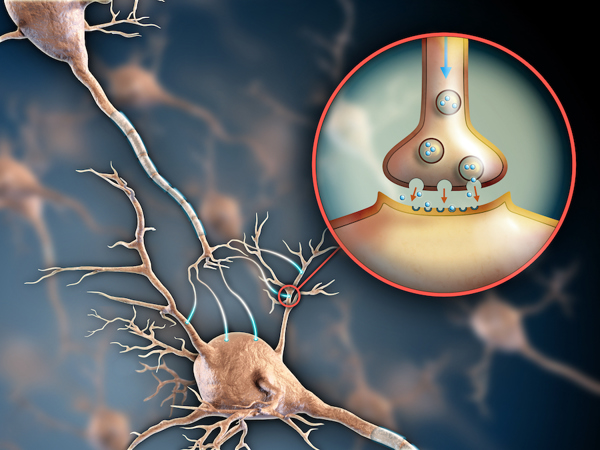
What are the chances that my child will have ADHD?
June 9, 2006

- Related Topics:
- Environmental influence,
- Complex traits,
- Neurodiversity
A curious adult from Iowa asks:
"My husband has ADHD. I do not. My mother has ADHD though. What are the chances my son will have it and does it follow the mother or father?"
As you know, ADHD stands for Attention Deficit Hyperactivity Disorder. People with this condition can't focus on a single task and have trouble sitting still.
Scientists don't yet know what causes ADHD. Therefore it's hard to predict who will get the condition and who won't.
But we can still come up with a rough guess for how likely your son is to get ADHD. How? We can first look at how often ADHD occurs in the general population. Then we can look at how often it occurs in families.
Heritability of ADHD
By crunching these kinds of numbers, we know that the average person has a 1 in 20 chance of having ADHD.1 But if that person has a parent, brother or sister with ADHD, he now has a 1 in 4 or 5 chance of getting it.2 Having a more distant relative with the condition doesn't really increase those odds.
Unfortunately we can't be any more precise than that.
Males do seem to be more prone to getting ADHD. They are two to four times more likely than females to have ADHD.3 This fact makes it seem like ADHD comes from the father. But it doesn't. Unlike other conditions like colorblindness and hemophilia, ADHD is just as likely to come from mom as dad.
So why is it so difficult to predict ADHD? For a couple of reasons.
First, there is probably more than one gene involved. This means it won't be as "simple" to figure out as diseases like Cystic Fibrosis or Sickle Cell Anemia.
Second, genes are only part of the story. The environment is likely to play a big role in whether or not a given person gets ADHD.

Genes and ADHD
Scientists are still trying to figure out what genes lead to an increased risk for ADHD. The most likely suspects are genes that control how cells talk to each other.
Each one of us is made up of a big group of cells. All of these cells have to work together to have things happen. One way cells talk to each other is by using hormones. Hormones are chemicals that are made by our own bodies to send messages from one group of cells to another.
Probably the most familiar hormone is adrenaline, or epinephrine. Adrenaline is used when your body needs to respond to stress. Like when a bear attacks or a fight is about to start. This response is called "Flight or Fight."
As soon as adrenaline is released into the bloodstream, your whole body prepares to either fight or run. You breathe faster, your heart beats quicker, your muscles tighten, your pupils dilate, your digestion slows, and lots of other things happen too.
A different hormone is thought to cause ADHD. This hormone is dopamine. Dopamine is made when your body is happy, like during a meal or after taking certain drugs. It is also very important in directing the way you move.
Let's think of dopamine as an invitation to a party that you're sending through the mail to all your friends. You need to be able to make the invitation. You need the postal worker to carry it to the sorting center. You need other people to make sure it gets processed and sent to its final destination. And finally, you need someone to open it at the receiving end.
If any of these steps goes awry, the invitation won't make it to your friends. And hormones work the same way.
Each step in the process is controlled by different genes. If one of those genes is not working, some of the cells in the body won't get the message.
People with ADHD tend to have certain DNA differences in their genes for the dopamine pathway.2,4,5 Often they are likely to have a dopamine receptor that isn't working well. Imagine that the mailbox at your friend's house is locked or missing. The postal worker can't deliver the invitation so he or she misses the party.
If your son inherits a mutation in a gene controlling the dopamine pathway, will he get ADHD? Maybe...but maybe not. His chances are higher than someone who does not have the mutation, but it's not a sure thing.

ADHD and environmental influence
Not everyone with ADHD has a mutation in the dopamine pathway, so there are probably other genes that are also involved. Your son may not have the right combination of genetic factors to get ADHD.
Also, genes are not the whole story. Things in the environment are sometimes needed to "trigger" the condition.
What are these environmental factors? One may be cigarette smoke. Babies exposed to cigarette smoke are more likely to get ADHD.6
Scientists have many ideas for what other factors are important. Many of these other things haven't yet been tested though.
Not everyone with a genetic risk factor develops ADHD. Likewise, not everyone exposed to an environmental risk factor gets ADHD. Some combination of the two is required. This scenario is true for many other complex conditions, like heart disease.
So in sum, the chances that your son will get ADHD are higher than most of the population since there is a family history. It's possible that he has inherited genes that make him susceptible to ADHD.
We don't know what those genes might be for sure, though, so there's no test you can take. Physicians and genetic counselors are great sources for additional information.

Author: Natalie Dye
When this answer was published in 2006, Natalie was a Ph.D. candidate in the Department of Biochemistry, studying bacterial cytoskeletal proteins in Julie Theriot's laboratory. Natalie wrote this answer while participating in the Stanford at The Tech program.
 Skip Navigation
Skip Navigation
